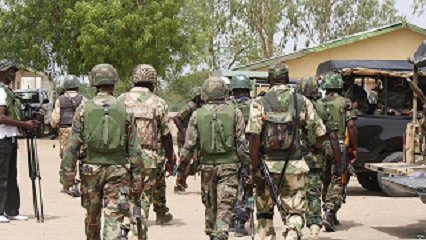The Nigerian army has warned communities, persons or groups having any form of land dispute to desist from involving the military in settling such matters or using them to intimidate perceived opponents.
They advised such persons to rather channel their grievances to the court of law.
The Commanding Officer, 14 Engineering Regiment, Onitsha, Anambra State, Lt. Col. P.A Adeke, gave the warning at Ihite Okija, Ihiala Local Government Area of the state, when he led a delegation of the Nigerian Army at the instance of army authorities in Abuja to the community where purported land grabbers erected sign posts in a piece of land supposedly belonging to the Anglican church, with the inscription: “Military zone, please, Keep off.”
The Anglican diocese of Nnewi, who owned the land, had reported to the army authorities in Abuja the alleged encroachment by some indigenes of Okija community, who used some people in military uniform to scare them out of the land.
Adeke explained that the said land did not belong to the Nigerian army, describing the action as not only criminal but impersonating punishable under the the law.
He said, “We were informed by the Diocese of Nnewi, Anglican communion, that four sons of Ihite Okija community conspired among themselves to covet a piece of land belonging to the Anglican church.
“We want to warn that people should not drag the Nigerian army into any form of land tussle or use the name of the Nigerian army as cover to covet people’s property.
“If any piece of land is in dispute, approach the court with prove of ownership, and get justice. It is not the constitutional duty of soldiers to sell lands or settle land disputes.”
The community’s spokesperson, Ide Nwabugwu Gregory was full of gratitude for the soldiers’ intervention, revealing the community’s plans to liaise with the military and the church to bring a lasting solution to the dispute.
A cleric in the diocese, Rev. Canon Godfrey Muotuanya, narrated how the land was acquired by the church in 1978 when Nnewi diocese was under the Niger diocese.
He said it was unable to develop it but regretted that certain individuals in the area conscripted some persons in army uniform to claim its ownership when the church was ready for the development.
















